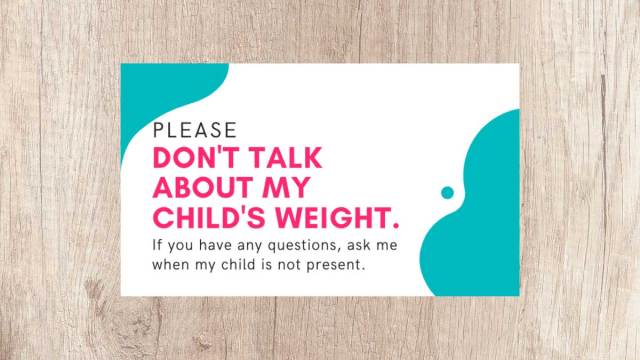When you realize your kids are facing the same minefield of adolescent insecurities that you had to navigate, parenting gets a touch more terrifying. But sidestepping one of the biggies just got a lot easier with More-Love’s “Don’t Talk About My Child’s Weight” cards.
“Did you know that you can ask your child’s doctor not to discuss weight in front of your child,” morelove.org, the organization that created the cards says on their site. “And there’s good reason to do this: in 2016, the American Academy of Pediatrics made the recommendations that healthcare providers not discuss weight with children and teens.”
Designed specifically for use while you’re in the exam room with your pediatrician, where discussions of weight often cause children to contemplate dieting more than they do developing healthier habits, these cards allow you to advocate for a less stigmatized discussion of your kid’s health in the exam room. But they also do the trick with coaches, teachers and family members who just don’t get it.
Research suggests that the more a person thinks he or she needs to lose weight, the more likely they are to engage in eating disorder behaviors. Every discussion about “weight” versus “healthy habits” becomes important—especially when kids have access to images and messages about literally everything appearance-related on social media.
Photo: iStock
In 2016, the American Academy of Pediatrics made the recommendations that healthcare providers not discuss weight with children and teens in a report on preventing “obesity” and eating disorders. Turns out, three common practices are associated with both. Dieting (defined as “caloric restriction with the goal of weight loss”), weight talk or “comments made by family members about their own weight or comments made to the child by parents to encourage weight loss” and being teased about one’s weight are the trifecta of what not to do if your goal is to help sidestep the associated issues of “obesity” and eating disorders.
Weird, because 1986 seemed to think all of this was a-ok. Luckily for our kids, it’s 2022 and we now know that many of the things that we did to keep weight off (cabbage soup diet, anyone?) actually increases it—while simultaneously promoting eating disorders.
—Shelley Massey
RELATED STORIES:
Dolly on a Dinosaur Is About to Get Even Bigger
How to Work from Home & Still Be Involved with Your Kids (It’s Possible!)
